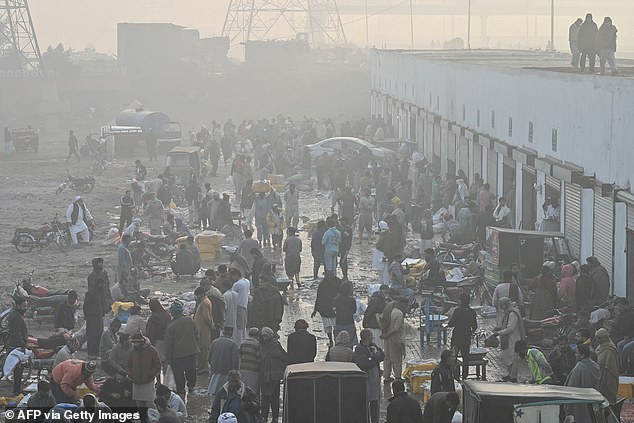A terrifying new study has predicted exactly how many people will die from climate change by 2100.
Researchers from the Max Planck Institute for Chemistry used advanced numerical simulations to estimate the mortality attributable to air pollution and extreme temperatures.
Their analysis indicates that a staggering 30 million people could perish by the end of the century thanks to climate change and air pollution.
‘In 2000, around 1.6 million people died each year due to extreme temperatures, both cold and heat,’ said Dr Andrea Pozzer, group leader.
‘By the end of the century, in the most probable scenario, this figure climbs to 10.8 million, roughly a seven-fold increase.
‘For air pollution, annual deaths in 2000 were about 4.1 million.
‘By the century’s close, this number rises to 19.5 million, a five-fold increase.’
The study comes shortly after a UN report warned that Earth is on track for ‘catastrophic’ 3.1°C of warming this century.

Researchers from the Max Planck Institute for Chemistry used advanced numerical simulations to estimate the mortality attributable to air pollution and extreme temperatures. Pictured: Lahore in smog on November 21

Their analysis indicates that a staggering 30 million people could perish by the end of the century thanks to climate change and air pollution
The researchers based their calculations on projections from 2000 to 2090, analysed in 10-year intervals.
Their analysis shows there will likely be significant regional differences in deaths from climate change.
South and East Asia are set to be the worst affected – driven by aging of the population, with air pollution still playing a major role, according to the study.
In contrast, in high-income regions such as Western Europe, North America, Australasia, and Asia Pacific, deaths related to extreme temperatures are expected to surpass those caused by air pollution.
In some countries within these regions, such as the US, England, France, Japan and New Zealand, this shift is already occurring.
The experts predict that the disparity is likely to grow, with extreme temperatures becoming a more significant health risk than air pollution also in countries of Central and Eastern Europe (Poland and Romania) and parts of South America (Argentina and Chile).
By 2100, temperature-related health risks are expected to outweigh those linked to air pollution for a fifth of the world’s population.
The researchers hope the findings will highlight the urgent need for actions to mitigate climate change.

‘In 2000, around 1.6 million people died each year due to extreme temperatures, both cold and heat,’ said Dr Andrea Pozzer, group leader. ‘By the end of the century, in the most probable scenario, this figure climbs to 10.8 million, roughly a seven-fold increase’. Pictured: Wildfires in California on September 7
‘Climate change is not just an environmental issue; it is a direct threat to public health,’ Dr Pozzer said.
‘These findings highlight the critical importance of implementing decisive mitigation measures now to prevent future loss of life,’ added Jean Sciare, director of the Climate and Atmosphere Research Center of The Cyprus Institute.
The study comes shortly after the UN released its annual report on the emission cuts needed to limit global warming to 1.5°C.
In the report, it warned this goal would ‘soon be dead’ without a global mobilisation on a scale and pace never seen before.
According to the UN, the world is on track for temperature rises of 2.6°C to 3.1°C, depending on how much of the currently-promised climate action is delivered.
Responding to the report, UN secretary general, Antonio Guterres, said the world was ‘teetering on a planetary tightrope’.
‘Either leaders bridge the emissions gap, or we plunge headlong into climate disaster – with the poorest and most vulnerable suffering the most,’ he said.
This article was originally published by a www.dailymail.co.uk . Read the Original article here. .


